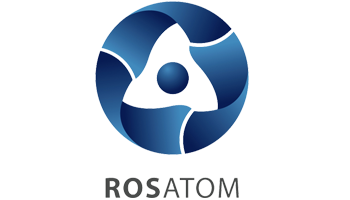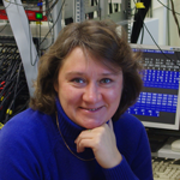Official website: inphe.mephi.ru
Strategic aim of the INPhE
The strategic aim is the creation and development of the world level scientific and educational center in the field of nuclear physics and technology, radiation materials science, elementary particle physics, astrophysics and cosmophysics.
The strategy of the INPhE development is aimed to taking leading positions in the following areas:
● nuclear energy of the XXI century (multicomponent nuclear energy, closed fuel cycle, nuclear waste disposal, NPP safety);
● radiation and beam technologies (materials science, radiation physics, electronics, etc);
● high-energy physics and elementary particle physics, astrophysics and cosmophysics (new states of matter, ultrahigh-energy particles, spin and polarization effects, properties of neutrino, and gamma-ray astronomy);
● applied aspects of the solar-terrestrial physics, improving of methods for monitoring of potentially hazardous processes in the Earth's atmosphere and near-Earth space;
● new system of training of personnel for the science-intensive sectors of the economy.
Education:
- Automation and Electronics
- Radiation Safety
- Nuclear Physics and cosmophysics
- Experimental methods of nuclear physics
- Elementary particle physics
- Physics of extreme states of matter
- Physics of nuclear reactor
- Materials science
- Thermophysics
- Technologies of closed nuclear fuel cycle
- Engineering computer simulation
Research:
- Fundamental Research and Particle Physics
- Atomic Power Industry
- Nuclear Systems and Materials
- Scientific and educational center NEVOD
Engineering
staff: 412
Students: 2692
Structure:
- Department of Radiation Physics and Safety of Nuclear Technologies (#1)
- Department of Automatics (#2)
- Department of Theoretical and Experimental Physics of Nuclear Reactors (#5)
- Department of Experimental Nuclear Physics and Cosmophysics (#7)
- Department of Materials Science (#9)
- Department of Experimental Methods of Nuclear Physics (#11)
- Department of Thermal Physics (#13)
- Department of Elementary Particle Physics (#40)
- Department of Physics of Extreme States of Matter (#60)
- Department of Closed Nuclear Fuel Cycle Technology (#89)
- Department of Computer Engineering Simulation (#91)
- Scientific & Educational Centre NEVOD
- Astrophysics Institute
- Interdepartmental Laboratory of Experimental Nuclear Physics
- Interdepartmental Laboratory of Silicon Photomultipliers
- Interdepartmental Laboratory of Perspective Technologies of New Material Creation
- Department of Automation, Control and Diagnostics (IATE MEPHI)
- Department of Mechanics and Strength of Nuclear Power Plant Construction (IATE MEPHI)
- Department of Equipment and Operation of Nuclear Power Plants (IATE MEPHI)
- Department of Design and Engineering of Nuclear Power Plant Reactors (IATE MEPHI)
- Department of Thermal Physics (IATE MEPHI)
- Department of Ecology (IATE MEPHI)
- Research
- Education
- Faculty
- Collaboration
- Publications
Ecology:
Development of technologies for decommissioning of nuclear power facilities (Green Field)
- Computational and experimental rationale and synthesis of perovskite compounds
- Techniques of estimation of contamination of NPP materials
Innovations
- Technologies of radioactive waste consolidation
- New nuclear power technologies
Partners
IAEA, SC Rosatom, ENEN, SC Roscosmos, NRC "Kurchatov Institute"





New forms of energy and subnuclear technologies:
Development of techniques for the detection of quark-gluon matter, dark matter particles and neutrinos
- Physics of heavy ions and quark-gluon matter
- Searching for new states of nuclear matter and applied research at the setups
- Astrophysical experiments and cosmology
- Search for new physics at colliders
Innovations
- New technologies of nuclear radiation registration
- NPP neutrino monitoring
- Nuclear medicine
Partners
NRC "Kurchatov Institute", CERN , JINR, INFN, BNL, ORNL






Safe nuclear energy:
Tolerant nuclear fuel, non-proliferation and guarantees, new principles of the nuclear power plant control
- New principles of detection of the nuclear reactor parameters
- New technologies of nuclear fuel consolidation
Innovations
- New materials
- New reactors:BN-1200 and VVER-SKD
- New technologies of accounting, control and physical protection of nuclear materials
Partners
IAEA, NEA/OECD, SC Rosatom, IMET RAS, ENEN







Power supply:
Two component nuclear power with a closed nuclear fuel cycle
- Development of systems based on electro-nuclear technologies (ADS)
- Innovative sources of neutrons
- New heat carriers
Innovations
- Multipurpose nuclear reactors
- New nuclear power technologies
- Materials for renewable power industry
Partners
IAEA (G-IV, INPRO), SC Rosatom, NRC "Kurchatov Institute", ENEN, ORNL





Ecology:
Development of technologies for decommissioning of nuclear power facilities (Green Field)
- Technology of the NPP decommissioning
- Materials for the renewable power generation
New forms of energy and subnuclear technologies:
Development of techniques for the detection of quark-gluon matter, dark matter particles and neutrinos
- Properties of quark-gluon plasma
- Basics of dark matter particle and neutrino detection
- Processes in the early Universe as the basis of the observed forms of energy
Safe nuclear energy:
tolerant nuclear fuel, non-proliferation and guarantees, new principles of the nuclear power plant control
- Control and safe operation of SCWR
- Tolerant nuclear fuel
- Innovative construction materials
- Technologies of protection against the nuclear material proliferation
Power supply:
two component nuclear power with a closed nuclear fuel cycle
- Innovative Nuclear Reactors
- Technologies of closed fuel cycle
| Training Directions | Degree |
|---|---|
|
14.03.01 Nuclear Power Engineering and Thermophysics 14.03.02 – Nuclear Physics and Technology 22.03.01 – Materials science and technologies of materials 14.05.01 – Nuclear reactors and materials 14.05.02 - Nuclear power plants:design,maintenance and engineering |
Bachelor's Degree/Specialist's Degree |
|
14.04.02 – Nuclear Physics and Technology 22.04.01 - Materials science and technologies of materials 14.04.01 - Nuclear energy and thermal physics 03.06.01 - Physics and astronomy 13.06.01 Electrical and Thermal Engineering 14.06.01 - Nuclear, thermal and renewable energy and related technologies 22.06.01 - Materials Engineering 24.06.01 Aviation and Rocket-Space Technology |
Master's Degree/Postgraduate Training program |
Foreign scientists - Co-leaders of the MEPhI Labs
Piero Spillantini (Italy) - PhD, prof., member of PAMELA and GAMMA-400 space experiments, H-index=48
e-mail: spillantini@fi.infn.it
David Besson (USA) - PhD, prof. of University of Kansas, Chair of SiPM Laboratory, H-index=71
e-mail: zedlam@ku.edu
Alexander Bolozdynya - Dr of Science, prof., Deputy Head of Laboratory for Experimental Nuclear Physics of MEPhI, H-index=19
e-mail: AIBolozdynya@mephi.ru
Alexander Vasiliev - Dr. of Science, prof., Scientific Supervisor, Russian chair of PANDA experiment, chair of the joint IHEP-MEPhI project SPASCHARM on spin study of strong interactions in Protvino, H-index=77
e-mail: Alexander.Vasiliev@ihep.ru
Andrea Chiavassa, PhD. - University of Turin and Istituto Nazionale di Fisica Nucleare, Italy. Professor of the Scientific & Educational Centre NEVOD, Co-director of the International Laboratory NEVOD-EAS, H-index=37
e-mail: andrea.chiavassa@to.infn.it
Michael Danilov - Dr. of Science, prof., Corresponding member of Russian Academy of Science, team leader of CMS MEPhI group, H-index=69
e-mail: danilov@lebedev.ru
Anatoli Romaniouk - PhD, prof., TRT project leader in the ATLAS experiment at LHC, H-index=45
e-mail: Anatoli.Romaniouk@cern.ch
Mikhail Skorokhvatov - Dr. of Science, prof., Russian group leader in the BOREXINO and DarkSide experiments, H-index=25
e-mail:Skorokhvatov_MD@nrcki.ru
Arkadiy Taranenko - PhD, associated prof., MEPhI group leader in international experiments HADES (GSI), NA61/SHINE (CERN) and PHENIX (BNL), H-index=44
e-mail: arkadij71@gmail.com
Anatoly Petrukhin – Dr. of Science, prof., Scientific Director of Experimental complex NEVOD, Chief Researcher, Head of the Leading Scientific Schools "Physics of cosmic-ray muons", H-index=12
e-mail: AAPetrukhin@mephi.ru
Christian Spiering, PhD. - DESY-Zeuthen & IceCube
Professor of the Scientific & Educational Centre NEVOD, H-index=53
e-mail: Christian.Spiering@desy.de
Ashot Chilingarian, PhD. - Director of the Alikhanyan National Laboratory, Armenia Professor of the Scientific & Educational Centre NEVOD, co-director of the International Laborator «Physics of Atmospheric Processes», H-index=43
e-mail: chili987@gmail.com
Dieter H.H. Hoffmann, Prof. Dr.Sc. Professor of the Technische Universität Darmstadt, Germany. Professor of the Department of Physics of Extreme States of Matter (dept. 60), H-index=46
e-mail: hoffmann@physik.tu-darmstadt.de
Hasebe Nobuyuki, Prof. Dr.Sc. Professor of the Waseda University, Tokyo, Japan. Professor of the Department of Experimental Nuclear Physics and Cosmophysics (dept. 7), H-index=18
e-mail: nhasebe@waseda.jp
Sparvoli Roberta, PhD. Associate Professor of the University of Rome Tor Vergata, Italy. Professor of the Department of Experimental Nuclear Physics and Cosmophysics (dept. 7), H-index=18
e-mail: Roberta.sparvoli@roma2.infn.it
Maximilian Wolff, PhD. Associate Professor of the Uppsala University, Sweden. Associate Professor of the Department of Materials Science (dept. 9), H-index=13
e-mail: max.wolff@physics.uu.se
Short Michael Philip, PhD. Associate Professor of the Massachusetts Institute of Technology, USA Associate Professor of the Department of Materials Science (dept. 9), H-index=8
e-mail: hereiam@mit.edu
Alex Umantsev, PhD. Professor of the Fayetteville State University, USA Associate Professor of the Department of Materials Science (dept. 9), H-index=11
e-mail: aumantsev@uncfsu.edu
Svetlana Kushpil, PhD. Researcher Nuclear Physics Institute of the CAS, Prague, Czech Republic Professor of the Department of Experimental Methods of Nuclear Physics (dept. 11), H-index=47
e-mail: skushpil@ujf.cas.cz
Vasily Kushpil, PhD. Researcher Nuclear Physics Institute of the CAS, Prague, Czech Republic Professor of the Department of Experimental Methods of Nuclear Physics (dept. 11), H-index=48
e-mail: kushpil@ujf.cas.cz
Borissov Alexander, PhD. Leading Researcher at the University of Heidelberg, Germany, Professor of the Department of Elementary Particle Physics (dept. 40), H-index=59
e-mail: aborisso@mail.cern.ch
Hasebe Nobuyuki, Prof. Dr.Sc. Professor of the Waseda University, Tokyo, Japan. Professor of the Department of Experimental Nuclear Physics and Cosmophysics (dept. 7).
e-mail: nhasebe@waseda.jp
Centers









Nuclear Universities




Partner Countries of the State
Corporation "Rosatom"














